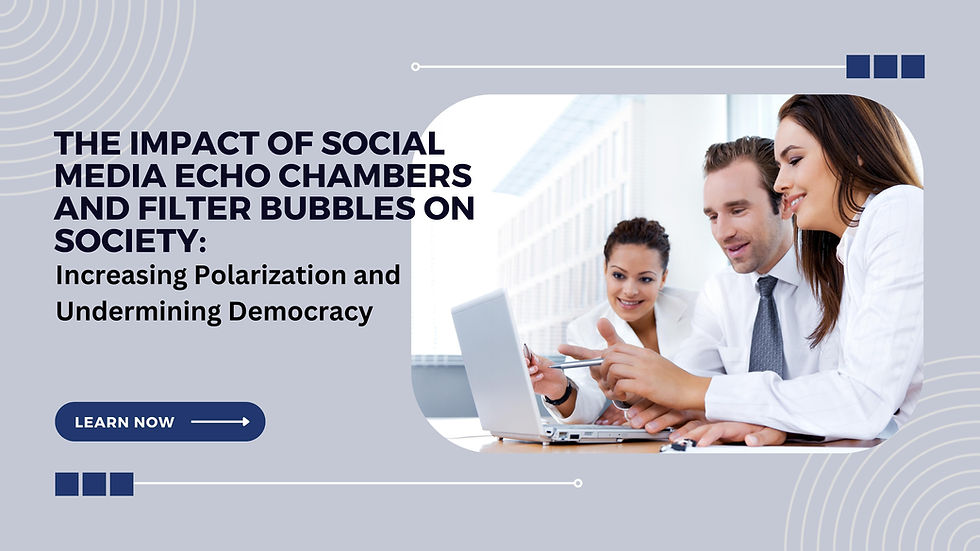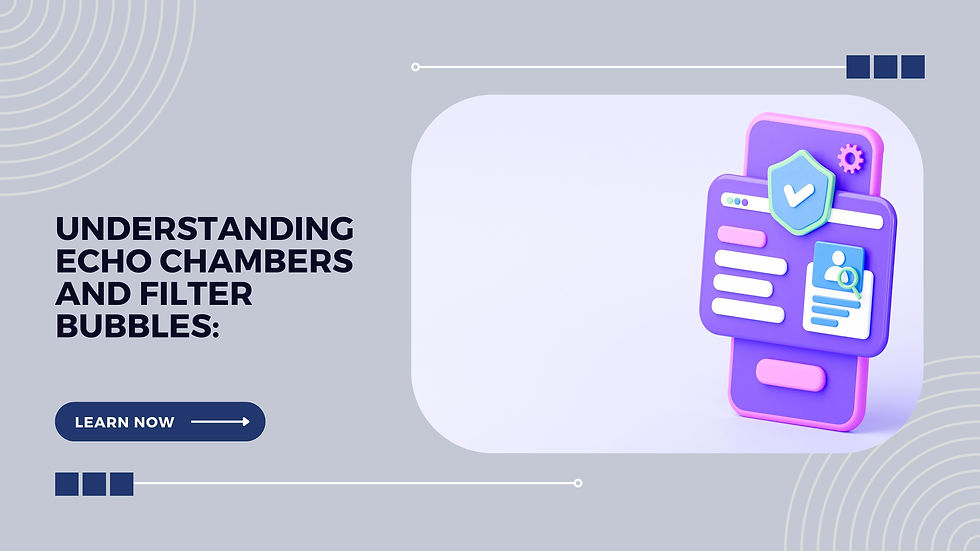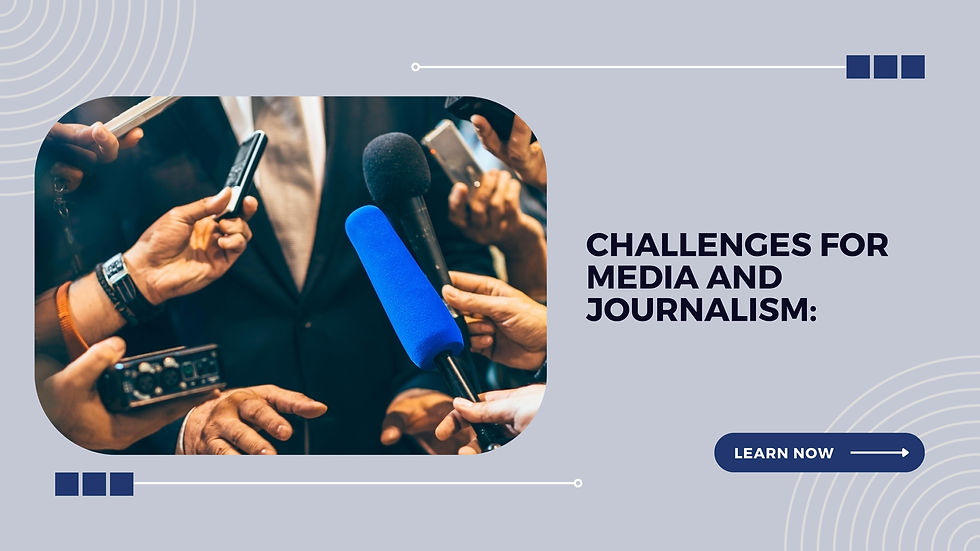

Introduction
Social media has transformed the way people communicate, obtain information, and interact with the world around them in the digital age. While these platforms allow people to communicate and share knowledge, they have also given rise to a phenomenon known as "echo chambers" and "filter bubbles." These online settings, in which individuals are predominantly exposed to material that aligns with their existing ideas, tastes, and values, have far-reaching societal repercussions. This essay investigates the impact of social media echo chambers and filter bubbles on polarisation and democracy, emphasising the problems they bring to a well-informed and united society.

Understanding Echo Chambers and Filter Bubbles
An "echo chamber" is a situation where individuals surround themselves with like-minded individuals or information sources that reinforce their existing beliefs, ideologies, and opinions.
On the other hand, a "filter bubble" refers to the personalized content algorithms used by social media platforms to show users information they are likely to agree with, based on their past interactions and preferences.
Together, these mechanisms create an environment where diverse perspectives are suppressed, leading to a narrowed worldview for individuals and groups.

Increasing Polarization
Social media echo chambers and filter bubbles have significantly contributed to the polarization of society.
When individuals are consistently exposed only to information that confirms their existing beliefs, it reinforces their viewpoints, making them more resistant to alternative perspectives.
This polarization not only deepens ideological divisions but also fosters an "us versus them" mentality, where opposing views are seen as hostile rather than as opportunities for constructive dialogue.
Furthermore, this phenomenon exacerbates political polarization, as it discourages people from engaging in conversations with those holding different opinions.
The lack of exposure to diverse ideas and the rise of echo chambers contribute to the amplification of extreme views and the marginalization of moderate positions.
As a result, political discourse becomes increasingly polarized and less constructive, hindering the potential for compromise and cooperation.

A functioning democracy depends on informed citizens who participate in open debates and conversations.
This ideal, however, is jeopardized by social media echo chambers and filter bubbles. Individuals may become misinformed or oblivious of opposing opinions as they are exposed to a narrow range of perspectives.
The asymmetry of knowledge can lead to uninformed voting and decision-making, damaging the democratic process.
Additionally, echo chambers and filter bubbles can be exploited by malicious actors, such as foreign governments or partisan groups, to spread misinformation and sow discord.
By tailoring messages to specific target audiences, these actors can manipulate public opinion, heighten societal divisions, and erode trust in democratic institutions.
The spread of disinformation within echo chambers can also lead to the creation of separate realities, where individuals are polarized not only in their beliefs but also in their understanding of facts.
This phenomenon, often referred to as "post-truth," weakens the foundation of a functioning democracy that relies on shared information and a common understanding of reality.

The rise of social media echo chambers and filter bubbles has posed significant challenges for traditional media and journalism. As people increasingly turn to social media for news and information, they are exposed to content that aligns with their existing beliefs, bypassing credible news sources and fact-checking mechanisms.
This trend has led to the decline of traditional journalism's influence, as sensationalized or biased information spreads more rapidly on social media platforms.
To adapt to the changing media landscape, journalists and media organizations must find ways to break through echo chambers and reach broader audiences.
They must prioritize accuracy, objectivity, and diversity in their reporting to counteract the spread of misinformation within closed information loops.

Mitigating the Impact
Addressing the negative impact of social media echo chambers and filter bubbles requires collective efforts from various stakeholders, including individuals, tech companies, policymakers, and media organizations:
1. Media literacy: Promoting media literacy in individuals can assist them in recognising and critically evaluating material offered in echo chambers. Education on fact-checking and prejudice is critical for equipping people to navigate the huge internet information landscape.
2. Algorithm transparency: Social media platforms should be open about their content algorithms and take measures to reduce the reinforcement of echo chambers and filter bubbles. Giving people more control over the content they see and encouraging exposure to other points of view can help to create a more informed and open online environment.
3. Cross-platform dialogue: Encouraging conversations and debates across different social media platforms can break down echo chambers and promote understanding between diverse groups. Platforms can facilitate this by designing features that encourage constructive dialogue and discourage toxic behavior.
4. Diverse content promotion: Media organizations and social media platforms can actively promote diverse and credible content to ensure that users are exposed to a broader range of perspectives. This could include partnerships with reputable news sources and fact-checking organizations.

Conclusion
The rise of social media echo chambers and filter bubbles has transformed the way people engage with information and each other. While these digital environments can provide a sense of community and belonging, they also contribute to increased polarization and threaten the foundations of democracy. By understanding the impact of these echo chambers and filter bubbles, society can take collective action to promote open dialogue, media literacy, and algorithmic transparency. Only through these efforts can we work toward a more informed, cohesive, and democratic digital society.
Read more about social media and its effects, click here.

Want to know more about ownsfare-
Ownsfare is the world's most unique social media platform, aiming to "bring this world a bit closer and make your goals come true one step at a time" by connecting with individuals all over the world, transcending physical limitations such as cities, age, gender, nations, and borders.
With zero distractions and clutter, Ownsfare (from Vasukam) lets you create and share images, audio tales, and opinions with the people that matter to you. Get the latest updates from people all around the globe, chat with old pals, and create your own life experiences. Discover a place where you can be yourself and discuss anything from mundane to life-changing events.

Yorumlar